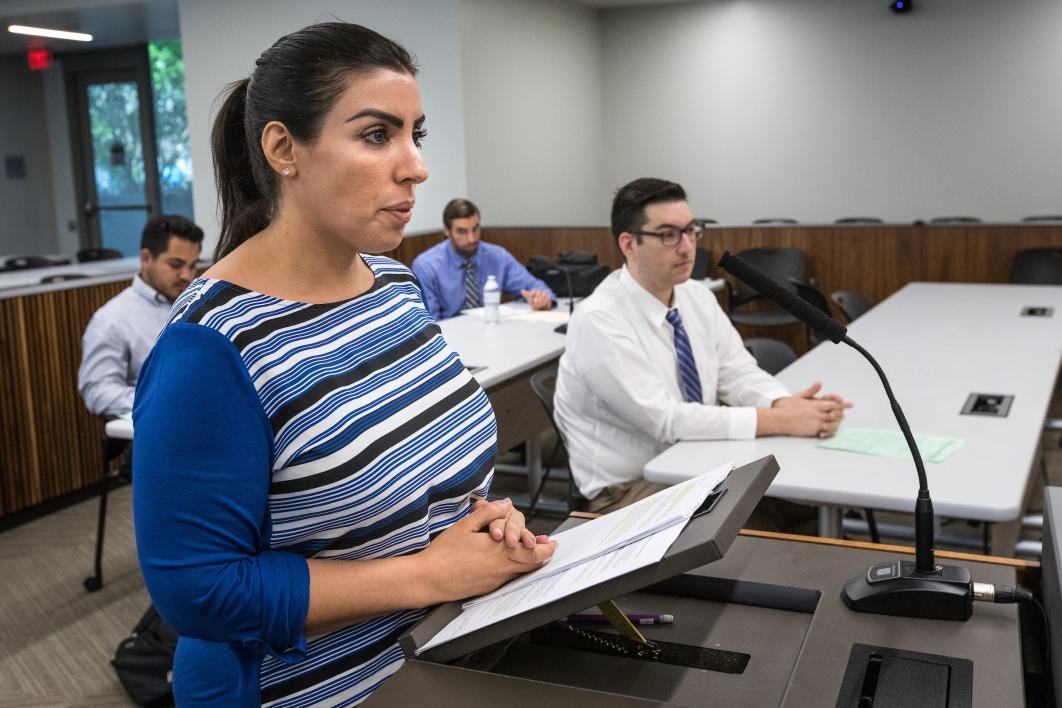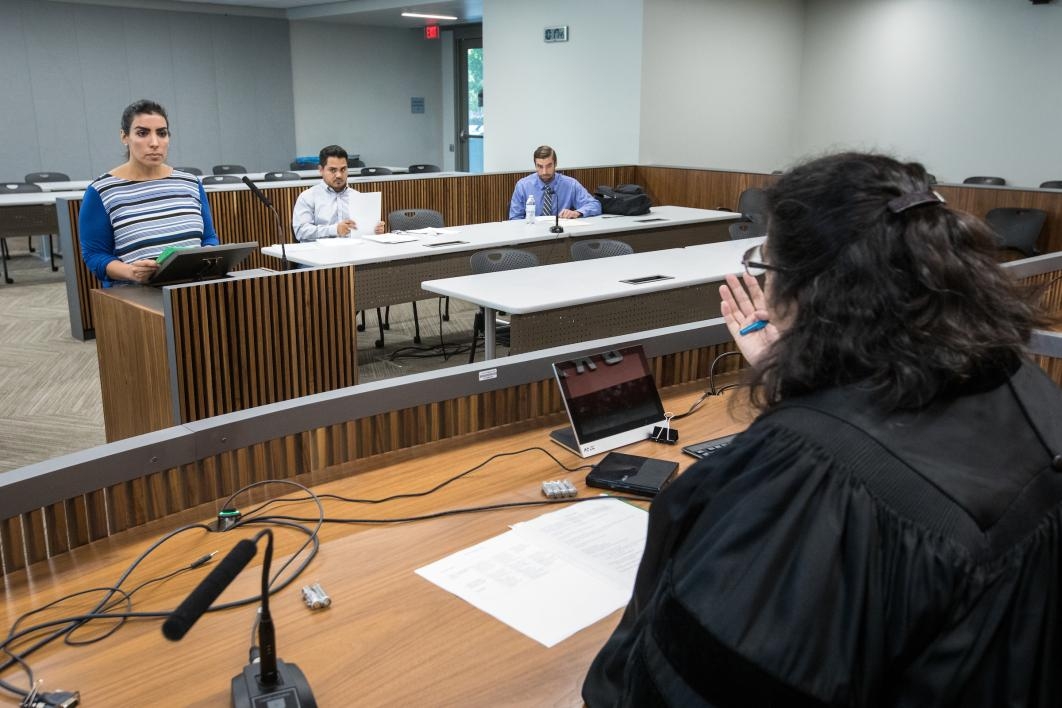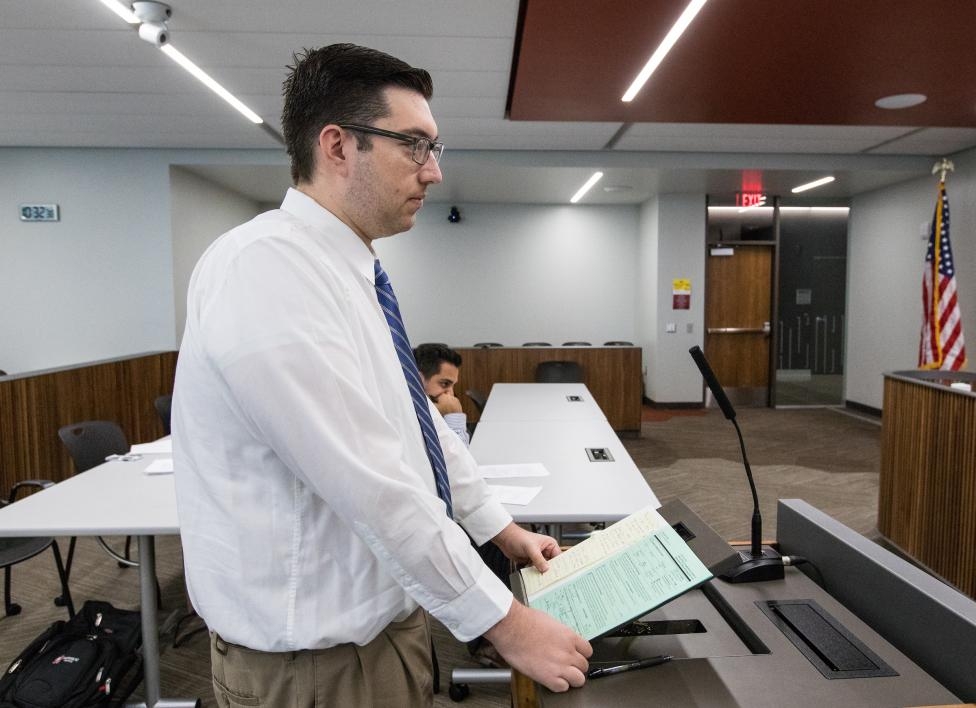ASU Law's immigration clinic prepares empathetic litigators
Immigration Law and Policy Clinic addresses vacuum in Arizona through collaboration

Immigration problems are wicked problemsA wicked problem is a form of social or cultural problem that is difficult to solve because of incomplete, contradictory and changing requirements. .
Lawyers are often forced to deal with mixed families, deportations, conflicting laws and personal issues that aren’t easily categorized.
Yet the director of Arizona State University's Immigration Law and Policy Clinic has a positive outlook on the challenges of the field.
“I often say I’m in the business of making lemonade,” said Evelyn Cruz, founder and director of the clinic. “You cannot be a pessimist if you do immigration.”
Housed in ASU’s Sandra Day O’Connor College of Law since 2006, the clinic seeks to address the current vacuum of immigration services in Arizona. It does so by collaborating with nonprofits, governmental agencies, other ASU departments, community advocates and funders to identify and develop projects that address Arizona’s immigration challenges.
According to Cruz, the state has unique and big challenges in this arena.
“Arizona is where California was about 20 years ago, and they’re still not on the other side yet,” Cruz said. “What makes Arizona a lightning rod is we have this Wild West mentality of ‘We’ll deal with our own problems,’ and that has led to lawsuits.”
The problems are plentiful: Arizona is home to more than 914,000 foreign-born residents with about a third lacking immigration status, according to the Migration Policy Institute. Most immigrants live in what demographers called mixed families, where some family members are citizens while others are either permanent lawful residents or lack immigration status.
The complexity of immigrant families and language barriers makes it difficult for them to navigate public services and the immigration process, often leaving families unable to obtain basic information and legal representation.
Cruz said immigration laws are constantly in flux and have a profoundly disruptive effect on peoples’ lives. Her approach is not to try fix immigration laws but to work within the system to help solve problems.
“I never tell my students what’s wrong with the system,” Cruz said. “I just tell them, ‘This is what we’ve got, this is how it works, and this is how this person ended up here. What can be done to help?'”
Cruz is quick to point out that the clinic is a teaching and learning environment, not a legal service. Therefore, the clinic is there to help students become ethical and professional lawyers, not to maximize representation of clients. As such, the clinic picks only a handful of students each semester and handles a few select cases, mostly representing immigrant children in foster care.
Students under Cruz’s tutelage learn administrative court trial techniques and procedures; provide immigration law advice at community outreach events; and draft motions, briefs, legal correspondence, closing statements and direct examination questions. The latter is mostly achieved through moot-court exercises Cruz performs three times a week inside the J. Grant Woods courtroom in the Beus Center for Law and Society on ASU’s Downtown Phoenix campus.
“These are skills the students can use in the real world once they graduate," Cruz said. “So while the short-term impact of a semester’s caseload is small, the lasting skills the students leave with means that they will be a force multiplier in the future.”
Sitting behind a wooden bench and sporting a black judge’s robe, Cruz held a moot-court exercise Sept. 13 with four of her students. The two-hour exercise covered decorum, legal procedures and maneuvers, and demonstrated how to plead and respond in a courtroom. For law student Haia Abdel, it was both a learning — and failing — opportunity.
“It was an enlightening experience because it made me realize I wasn’t really prepared,” said Abdel, whose father emigrated from Palestine in the 1980s. “But I’d rather fumble in front of my professor and colleagues than in front of attorneys and judges because the law community is very small. You never want to be that person who messes up and they end up talking about you.”
What motivates Daniel Chrisney, a third-year law student, are his wife’s family from Mexico and his “Dreamer” friends, who live in fear regarding their immigration status.
“It’s the everyday lack of certainty that motivates me to want to do this work,” he said. “To wake up every day in a country where you’ve decided to make your life, that’s something I can’t fathom. It must be sheer mental torture.”
Cruz said immigration law will continue moving in the same direction until it “addresses the human context and the realities of life.” She added, what is politically palpable is often what becomes law, not “what is economically, socially and culturally needed.”
“Inefficiencies have been created from a desire to become more tough, but it’s also become more bureaucratic,” Cruz said. “So, we’ll just keep making lemonade.”
Making lemonade often means trying to make life a little sweeter for those who can’t legally fend for themselves — mostly immigrant children.
Outside the class, students are asked to dedicate 135 hours during the semester to representing children in immigration court, handling cases for immigrant children in foster care and partaking in a community outreach project.
“We’re doing what we read about in class, getting to know our clients, understanding their backgrounds and honing in on advocacy and social justice,” said Nicholas Bustamante, a second-year law student who has filed legal briefs on behalf of DACAThe Deferred Action for Childhood Arrivals program was implemented during former President Barack Obama's administration that allows young immigrants living in the country illegally who were brought here as children to remain in the U.S. It does not convey legal status but conveys temporary protection from deportation and permission to legally work. DACA recipients are commonly referred to as "Dreamers," based on never-passed proposals in Congress called the DREAM Act that would have provided similar protections for young immigrants. students. “It’s only then that you realize immigrants don’t have a process in this country and the law keeps changing for them, day after day.”
Not only is the clinic a teaching model for students, it’s catching on in other parts of the world. Cruz is setting up clinics in Mexico and Pakistan, having recently hosted more than 15 scholars from Mexico.
“We’re starting to plant seeds in other countries, and we should share our knowledge with other teachers,” Cruz said.
Cruz said the clinic teaches many things, but most importantly, that the law should be humane.
“The law is a service,” Cruz said. “As a law school that is embedded in this community, part of our goal is to instill in our students that they possess a wonderful skill to serve others.”
Top photo: Second-year law student Brett Andersen hands in his notice of entry of appearance as attorney to Clinical Professor Evelyn Cruz as she plays the role of judge to her law students in her Immigration Law and Policy Clinic on Sept. 13 in a Beus Center for Law and Society courtroom. The four students each entered appearances in the moot court on behalf of children with immigration issues. Photo by Charlie Leight/ASU Now
More Law, journalism and politics

CBS News president to give keynote address at Cronkite School’s spring convocation
Ingrid Ciprián-Matthews, president of CBS News, will serve as the keynote speaker at Arizona State University’s Walter Cronkite School of Journalism and Mass Communication spring 2024 convocation. …

School of Politics and Global Studies director's new book explores mass violence
Why do people commit atrocities and why are certain groups, including religious and ethnic, more vulnerable to large-scale violence? These questions are explored in a new book by Güneş Murat Tezcür…

ASU faculty contributing to improvement of Wikipedia
Many academics have a love-hate relationship with Wikipedia. While the website has information about almost anything you can imagine, the credibility of that information is sometimes suspect. Tracy…


